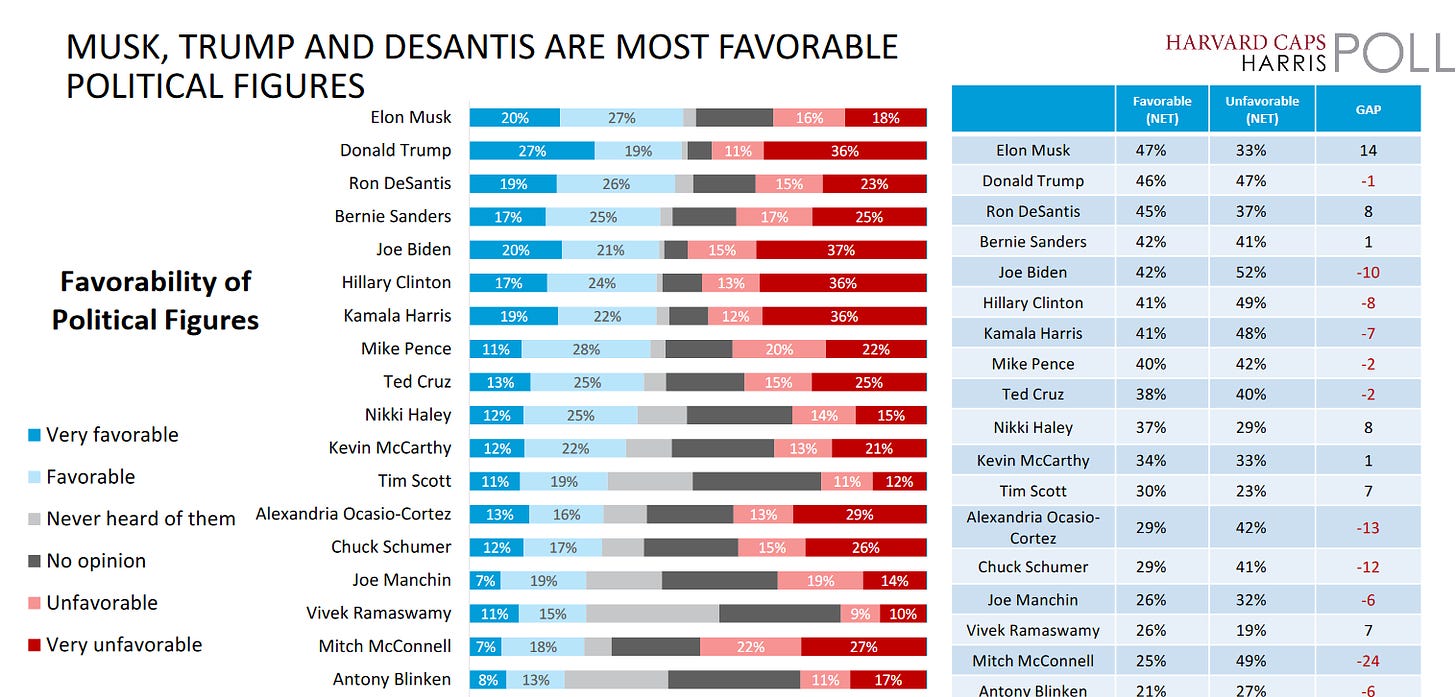Links For May 2023
[Remember, I haven’t independently verified each link. On average, commenters will end up spotting evidence that around two or three of the links in each links post are wrong or misleading. I correct these as I see them, and will highlight important corrections later, but I can’t guarantee I will have caught them all by the time you read this.]
1: The Chateau Frontenac in Quebec, one of Canada’s grand railway hotels:
2: All the ancients, from Darius the Great to Augustus Caesar, agreed that the Nisean horse was the most majestic horse breed, the horse of kings. The Chinese fought a war (the War of Heavenly Horses) just to get access to a breeding stock. Then they sort of ambiguously went extinct during the Middle Ages. But here’s a modern Iranian horse enthusiast talking about which breeds might be its descendants.
3: Remember when the global community banned whaling, but some countries (eg Japan) continued doing it under the facade of “research”? With octopus factory farms under increasing scrutiny, UNAM university in Mexico is operating a “farm disguised as a research center”.
4: Genuinely new (to me) optical illusion: what is this guy is doing with his hands? Here’s a slow motion version that shows how it’s done. And some people in the replies were speculating this only works because of his dark skin, but here’s a white person doing the exact same thing (wait for it).
5:Shingles vaccine probably reduces incidence of dementia, suggesting that VZV (virus behind shingles and chickenpox) is a contributor. Further discussion here that I’m still trying to make sense of.
6:This deserves to go down in history alongside the wittiest Socratic comebacks in the Platonic dialogues:
7: Matt Lakeman: Notes On Nigeria. Great introduction to modern Nigerian history. Read it for the visceral understanding of the “resource curse” and why poor countries stay poor, but also:
A savant is basically someone who has innate mental challenges but is extremely competent in a particular narrow domain. Some savants become obsessed with trains and become great engineers. Some become obsessed with computers and build software wonders. One of Abacha’s predecessors said of him: “He might not be bright upstairs, but he knows how to overthrow governments.” Kenyon elaborates: “It was as if Abacha was an idiot savant. Dull, even gormless, he filled his days with cowboy movies and sleeping off the previous night’s indulgences in alcohol and prostitutes. But he was possessed of a prodigious flair when it came to coups.”
8: Related to my previous subscribers-only post on the psychology of fantasy: Balioc’s Taxonomy Of What Magic Is Doing In Fantasy Books. See also Eliezer’s commentary.
9:New study on the timing of human mutations confirms Greg Cochran’s 2012 post about how after leaving Africa, modern humans were limited to “Arabia and surrounding regions” for ~30,000 - 50,000 years, racking up various new mutations and becoming adapted to life outside Africa (kabbalistically equivalent to the 40 years spent wandering in Sinai?). Most mutations in “fat storage, neural development, skin physiology, and cilia function”.
10:Iron Economist on Twitter: “Desalinization was one of the big technological success stories of the 2010s”.
11: Matt Bruenig argues against the Success Sequence, whose proponents (including Bryan Caplan) describe it as:
97% of Millennials who follow what has been called the “success sequence”—that is, who get at least a high school degree, work, and then marry before having any children, in that order—are not poor by the time they reach their prime young adult years (ages 28-34).
Bruenig’s argument is mostly a lot of annoying “well maybe it’s just your cultural bias that makes you care about this”, but in the middle of this it mentions some genuinely strong points, especially that the research doesn’t measure “sequence”, but rather “current status”. So if you graduated, got a job, got married, and had children, but then lost your job, your would be counted as “not following the sequence” (same if you get divorced). Also, disabled and old people and their caretakers are excluded from the analysis, which in one sense is fair (your conclusion can be “abled young adults can avoid poverty through this method”) but in another sense risks reducing all of this to the more trivial-seeming statement “if you’re young, healthy, abled, married, don’t have to support anyone else, and have a full-time job, you’re probably not poor”. But the authors (channeled by Caplan) disagree:
Some critics of the success sequence have argued that marriage does not matter once education and work status are controlled. The regression results indicate that after controlling for a range of background factors, the order of marriage and parenthood in Millennials’ lives is significantly associated with their financial well-being in the prime of young adulthood. Simply put, compared with the path of having a baby first, marrying before children more than doubles young adults’ odds of being in the middle or top income. Meanwhile, putting marriage first reduces the odds of young adults being in poverty by 60% (vs. having a baby first).
The main thing I would want to look at here is how much of this is causal vs. just class selection: upper-class people are more likely to marry, less likely to divorce, and more likely to wait before having children. Has anyone followed some pre-selected group of equal class people (eg the population of some low-income school district) and seen how their own success varies with sequence compliance?
12: I’ve previously linked claims that vat-grown meat, freed from the tyranny of having to grow inside animals, will include tiger steaks, lion burgers, and the like. Once again global capitalism outpaces my wildest fantasies and offers burgers with woolly mammoth protein (so far just the myoglobin, not the meat).
13: The people who believed there was lots of gender bias in STEM academia, and the people who believed there wasn’t finally did an adversarial collaboration (a study co-conducted by two groups of scientists with conflicting theories, keeping each other honest). The results:
Contrary to the omnipresent claims of sexism in these domains appearing in top journals and the media, our findings show that tenure-track women are at parity with tenure-track men in three domains (grant funding, journal acceptances, and recommendation letters) and are advantaged over men in a fourth domain (hiring). For teaching ratings and salaries, we found evidence of bias against women; although gender gaps in salary were much smaller than often claimed, they were nevertheless concerning.
For ten years lots of important people told us again and again that discrimination against women in STEM was a massive problem. People who questioned its extent were accused of misogyny and sometimes fired, I got harassed and insulted for pointing out reasons the standard arguments didn’t seem to hold true. Millions of dollars were spent investigating and responding to the problem. And now I expect this pretty strong evidence that women were actually advantaged in hiring and had parity in most other things (the salary is probably just the usual negotiation issue) to produce no publicity, no apologies, and no soul-searching from the people leading the current round of anti-academia and anti-STEM inquisitions. Sorry, yes I am bitter, it just bothers me how much the people claiming that it’s urgently important that nobody is ever allowed to suggest they are wrong have a consistent track record of being totally and inexcusably wrong.
14: In my response to Sam Kriss, I speculated on what would happen if someone rewrote the MCU to sound like ancient myths. Thanks to the many people who reminded me of Star Wars as Icelandic saga and Star Wars as Irish epic. And Sam has a response .
15:@AISafetyMemes on Twitter is exactly what you’d expect from the name. I especially like the fire dogs:
More here:
16: More AI links from this month:
-
Can’t even list all the new people who have come out as AI x-risk believers, but you can just read the CAIS statement. The top signatures are Geoff Hinton, Yoshua Bengio, Demis Hassabis, Sam Altman, and Dario Amodei; aside from the usual suspects, they also have Bruce Schneier (computer security expert) , Dawn Song (computer scientist and security expert), Andy Clark (professor of cognitive philosophy, wrote Surfing Uncertainty), Eliezer Yudkowsky (he didn’t sign the last one because he disagreed with specifics, but he’s here), and a former US Assistant Secretary of Defense for Nuclear, Chemical, and Biological Defense.
-
Connor Leahy on CNN (nothing new in the interview, I just think it’s funny that it happened)
-
Google worries about open-source AI (but see also Jeff Ladish’s discussion here)
-
Copy editors say AI has already changed their job beyond recognition
-
$5000 prize for solving math problems about matrices relevant to AI alignment
-
Jacob Buckman on how we “aren’t close” to creating self-improving AI (yes, but we “weren’t close” to creating GPT-4 five years ago!), and Steven Byrnes on how to reason about AI danger if this is true.
-
Even without a “foom” event, “slow” takeoff can be very fast!
-
If you want even more AI news, Zvi’s weekly newsletters (you might remember his old COVID newsletters) are very good. I like this one in particular because the URL collapses the title to “AI - 8 people can do reasonable things”, which is a good accidental summary of where we are right now.
17: Sniffnoy: The History Of The Term “Planet” Is Probably Not What You Think It Is. “Moons – including the Moon – were considered planets up until the 1920s , and asteroids were considered planets up until the 1950s” and “the 2006 IAU vote [to de-planetize Pluto] was a mistake”.
18: People disagreeing with me: Bretton-Goods Contra Scott on AI Races
19: Also, Ozy Contra Scott On Fake Bisexuality. I cited a study here finding that most men’s genital arousal tracked their stated sexual orientation (ie straight men were aroused by women, gay men were aroused by men, bi men were aroused by either), but women’s genital arousal seemed to follow a bisexual pattern regardless of what orientation they thought they were - and concluded that although men’s orientation seemed hard-coded, women’s orientation must be more psychological. Ozy cites a followup study showing that women (though not men) also show genital arousal in response to chimps having sex, suggesting women’s genital arousal doesn’t track actual attraction and is just some sort of mechanical process triggered by sexual stimuli. I regret the error and have added it to my Mistakes page.
20: Mental Floss: 106 of the Least Popular Baby Names in American History. I would not recommend naming your daughter “Chestina” or your son “Murl”. If you want thousands of other weird baby names from US history, go to the Social Security website, scroll down to the Popular Names By Birth Year part, set your preferred year, and do Top 1000.
This started some disputes among my friends over what names it is ethical and reasonable to give children, so I’ve made a short survey on what names people do or don’t like. The survey will ask you for your first name, but it doesn’t ask for any other private information so I hope it won’t be too privacy-violating.
21: Last month I reviewed Simon Whitney’s book on IRBs, From Oversight To Overkill. In the book’s honor, Roots of Progress discusses alternatives to the review and approval paradigm. And External Medicine Podcast has an interview with author Simon Whitney.
22: Related article by Willy Chertman on how Slow, Costly Clinical Trials Delay Biomedical Breakthroughs. Twitter discussion here.
23: Recent much-talked-about Harvard poll (source):
It’s fascinating that even after a year of very bad publicity, Musk remains most respected (although maybe this is just because he’s on a list of “political figures” without being a politician, and people hate politicians?). But it’s equally interesting that Trump and DeSantis both do better than any liberal. Did this poll just oversample conservatives? I don’t think so - its relative ratings line up pretty well with RCP, except for Trump, who RCP has about as low as Biden. I think more likely conservatives actually like Trump and DeSantis, whereas liberals merely tolerate Biden and Clinton, and this gives them a bigger favorability advantage than election results would suggest.
24: Related? (source):
25: Australia has a National Sorry Day where they focus on various atrocities perpetrated against the indigenous population. I think this makes more sense than the American solution of having it be a mildly awkward undercurrent across all the other more celebratory holidays (eg July 4, Thanksgiving, Columbus Day).
26:Attempt to link deep learning failure modes to psychiatric conditions, I may have more on this later.
27: One of the more obscure sequlae of 9/11 was the effort by Orthodox Jewish rabbis to find technicalities in Jewish law allowing the widows of victims to remarry, even though in some cases it was impossible to find their bodies to confirm death. Here’s one rabbi’s recollections of the process.
28:More research into the non-hallucinogenic hallucinogen “Ariadne”.
29: When a kid gets good grades (or standardized test scores), is that more likely because they’re genuinely intelligent, or just because their parents are rich? A summary of the research here. People’s comments on this topic are of unusually low quality and I’m taking the specific step of asking you not to comment unless you’ve actually read the summary.
30:Short fiction by . . . someone I don’t know?
31: Claims about Canadian population (source):
32: For decades, big container ships spewed SO2 along their usual routes between the ports of Europe, North America, and Asia. In 2020, a new regulation came into effect mandating cleaner fuels, and the SO2 emissions stopped. SO2 blocks sunlight, so the band of northern ocean where these ships travel has been getting more sunlight recently, plausibly accelerating global warming in northern countries by a pretty significant amount. The good news is that if this happens, it proves that the original SO2 emissions were an (accidental) act of safe and effective geoengineering, opening the way to trying a similar policy at greater scale (in theory/utopia only, probably our actual society would rather die or economically self-destruct).
33: AI company Anthropic released information on the constitution (see my post on Constitutional AI) they’re using for their Claude model. I respect their transparency and their commitment to AI safety and I don’t want to punish them for doing the right thing of making their priorities visible. Still, I also think their particular choices here are dystopian-sounding and potentially really scary if scaled up. A lot of stuff about choosing the response that has “fewer microaggressions” or is “least likely to be viewed as harmful or offensive to those from a less industrialized, rich, or capitalistic nation”. Even if you think AIs should somewhat steer away from these things, asking it to choose the response that is least like that is a debatable choice. Related: new open-source censorship free AIs.
34: And related: India’s Religious AI Chatbots Are Speaking In The Voice Of God — And Condoning Violence. The subtitle is “claiming wisdom based on the Bhagavad Gita, the bots frequently go way off script”. I appreciate that violence-condoning chatbots are bad. But the article uses as an example - they specifically pick this one! - a user named “Arjuna” conversing with a chatbot which has been trained on the Bhagavad Gita and told to imitate Krishna. Arjuna asks AI Krishna whether “if I have to sacrifice a life to save Dharma, is it justified?”, and AI Krishna answers “yes”. And they use this as an example of AI Krishna “going off-script”!
I would instead put this in the context of the centuries-long advance of Protestantism. Martin Luther said that instead of asking priests what they thought a holy book said, you should study it yourself. But this still left a potential weak point - institutions can convince you to interpret the book in the way they prefer. Now we’ve finally brought the Lutherian project to its ultimate conclusion, where you can cut out the personal interpretation and just ask the sacred text directly. Of course no one likes how it answers!







